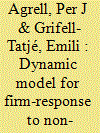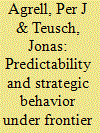| Srl | Item |
| 1 |
ID:
150832


|
|
|
|
|
| Summary/Abstract |
Economic network regulation increasingly use quantitative performance models (from econometrics and engineering) to set revenues. In theory, high-powered incentive regulation, such as revenue-caps, induces firms to cost-efficient behavior independent of underlying model. However, anecdotal evidence shows regulated firms occasionally maintaining cost-inefficiency under incentive regulation even under slumping profitability. We present a model for firm-level efficiency under a regime with a probability of failure explaining this phenomenon. The model is based on the hypothesis that the regulatory choice of method can be associated with intrinsic flaws leading to judicial repeal and replacement of it by a low-powered regime. The results show that the cost efficiency policy is proportional to the type of firm (cost of effort), value of time (discount factor) and the credibility of the method (risk of failure). A panel data set for 2000–2006 for 128 electricity distributors in Sweden is used to validate the model predictions (radical productivity slowdown, failing profitability and efficiency) at the launch and demise of a non-credible regulation method. The work highlights the fallacy of viewing incentive regulation as a method-independent instrument, a result applicable in any infrastructure regulation.
|
|
|
|
|
|
|
|
|
|
|
|
|
|
|
|
| 2 |
ID:
171385


|
|
|
|
|
| Summary/Abstract |
Frontier-based yardsticks, as applied in European energy network regulation, are not immune to strategic behavior. Under yardstick regulation, the regulator gauges the operator against a cost target set by the other firms in the sector. Many regulators have implemented frontier-based yardsticks where the cost function is defined by the most efficient firms (peers). This paper demonstrates that when it is possible to predict peers in advance, firms can manipulate the frontier to their advantage. We single out horizontal mergers as a plausible means to achieve such strategic objectives and develop a measure to identify strategic mergers ex ante. Using data from the electricity distribution sector in Norway that is subject to stable frontier-based regulation allows us to identify firm behavior that is consistent with our predictions. The paper contributes to the modern yardstick literature as existing evidence of strategic behavior in related regulatory settings is either based on anonymized questionnaire responses from regulatory authorities or relies on simulations using unidentified firms that are not actually exposed to such benchmarking in practice. The paper concludes by discussing policy implications.
|
|
|
|
|
|
|
|
|
|
|
|
|
|
|
|
| 3 |
ID:
117278


|
|
|
|
|
| Publication |
2013.
|
| Summary/Abstract |
Grid infrastructure managers worldwide are facing demands for reinvestments in new assets with higher on-grid and off-grid functionality in order to meet new environmental targets. The roles of the current actors will change as the vertical interfaces between regulated and unregulated tasks become blurred. In this paper, we characterize some of the effects of new asset investments policy on the network tasks, assets and costs and contrast this with the assumptions of the current economic network regulation. To provide structure, we present a model of investment provision under regulation between a distribution system operator and a potential investor-generator. The results from the model confirm the hypothesis that network regulation should find a focal point, should integrate externalities in the performance assessment and should avoid wide delegation of contracting-billing for smart-grid investments.
|
|
|
|
|
|
|
|
|
|
|
|
|
|
|
|